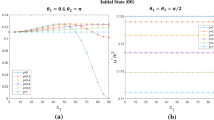Abstract
The recently proposed modified EWL scheme aims to understand the role of two-qubit entangling operators in controlling the game dynamics. In this work, we quantize the classical Cournot and Stackelberg duopoly games using the modified EWL scheme to understand duopoly games from the perspective of quantum operators. We have found two interesting results: Firstly, in both Cournot and Stackelberg duopoly, the profit function of the firms depends upon the entangling operator only when the firms adapt different strategies. Secondly, the outcome of the firms can be made equal with a suitable choice of entangling operator upon interchanging the strategies of the firms. We have shown the validity of both the theorems for pure and mixed strategies. The observation holds good for both Cournot and Stackelberg duopoly games. Further, we have shown the difference in the outcome of the firms in the Stackelberg duopoly game can be minimized to some extent with the help of suitable entangling operators and strategies.


Similar content being viewed by others
Explore related subjects
Discover the latest articles, news and stories from top researchers in related subjects.References
Von Neumann, J., Morgenstern, O.: Theory of Games and Economic Behavior. Princeton University Press, Oxford (1947)
Colman, A.M.: Game Theory and its Applications in the Social and Biological Sciences. Butterworth-Heinemam, Oxford (1995)
Meyer, D.A.: Quantum strategies. Phys. Rev. Lett. 82, 1052–1055 (1999)
Guo, H., Zhang, J., Koehler, G.J.: A survey of quantum games. Decis. Support Syst. 46, 318 (2008)
Flitney, A.P., Abbott, D.: An introduction to quantum game theory. Fluct. Noise Lett. 2, R175 (2002)
Piotrowski, E.W., Sladkowski, J.: An invitation to quantum game theory. Int. J. Theor. Phys. 42, 1089 (2003)
Khan, F.S., Solmeyer, N., Balu, R., et al.: Quantum games: a review of the history, current state, and interpretation. Quant. Inf. Process. 17, 309 (2018)
Eisert, J., Wilkens, M., Lewenstein, M.: Quantum games and quantum strategies. Phys. Rev. Lett. 83, 3077–3080 (1999)
Marinatto, L., Weber, T.: A quantum approach to static games of complete information. Phys. Lett. A 272, 291–303 (2000)
Vijayakrishnan, V., Balakrishnan, S.: Role of two-qubit entangling operators in the modified Eisert-Wilkens-Lewenstein approach of quantization. Quantum Inf. Process. 18, 112 (2019)
Vijayakrishnan, V., Balakrishnan, S.: Significance of entangling operators in the purview of modified EWL scheme. Quantum Inf. Process. 19, 315 (2020)
Gibbons, R.: Game Theory for Applied Economists. Princeton University Press, Oxford (1992)
Cournot, A.: Researches Into the Mathematical Principles of the Theory of Wealth, Edited by N. Bacon, Macmillan, New York (1897)
Stackelberg, H.V.: Marktform und Gleichgewicht. Julius Springer, Vienna (1934)
Iqbal, A., Toor, A.H.: Backward-induction outcome in a quantum game. Phys. Rev. A 65, 052328 (2002)
Lo, C.F., Kiang, D.: Quantum Stackelberg duopoly. Phys. Letts. A 318, 333–336 (2003)
Li, H., Du, J., Massar, S.: Continuous-variable quantum games. Phys. Letts. A 306, 73–78 (2002)
Frackiewicz, P.: Remarks on quantum duopoly schemes. Quantum Inf. Process. 15, 121–136 (2016)
Shi, L., Xu, F., Chen, Y.: Quantum Cournot duopoly game with isoelastic demand function. Phys. A. 566, 125614 (2021)
Lo, C.F., Kiang, D.: Quantum Stackelberg duopoly with incomplete information. Phys. Letts. A 346, 65–70 (2005)
Frackiewicz, P.: On subgame perfect equilibria in quantum Stackelberg duopoly with incomplete information. Phys. Letts. A 382, 3463–3469 (2018)
Frackiewicz, P.: Quantum approach to Cournot-type Competition. Int. J. Theor. Phys. 57, 353–362 (2018)
Shi, L., Xu, F.: Quantum Stackelberg duopoly game with isoelastic demand function. Phys. Letts. A 385, 126956 (2021)
Zhang, J., Vala, J., Whaley, K.B., Sastry, S.: Geometric theory of nonlocal two-qubit operations. Phys. Rev. A 67, 042313 (2003)
Rezakhani, A.T.: Characterization of two-qubit perfect entanglers. Phys. Rev. A 70, 052313 (2004)
Nielsen, M.A., Chuang, I.L.: Quantum Computation and Quantum Information. Cambridge University Press, Cambridge (2000)
Elgazzar, A.S.: Quantum prisoner’s dilemma in a restricted one parametric strategic space. Appl. Math. Comput. 370, 124927 (2020)
Elgazzar, A.S.: Coopetition in quantum prisoner’s dilemma and COVID-19. Quant. Info. Process. 20, 102 (2021)
Elgazzar, A.S., Elrayes, H.A.: Quantum symmetric cooperative game with a harmonious coalition. Zeitschrift für Naturforschung A 73(1), 69–73 (2018)
Author information
Authors and Affiliations
Corresponding author
Additional information
Publisher's Note
Springer Nature remains neutral with regard to jurisdictional claims in published maps and institutional affiliations.
Rights and permissions
About this article
Cite this article
kameshwari, A.V.S., Balakrishnan, S. Cournot and Stackelberg duopoly games in the purview of modified EWL scheme. Quantum Inf Process 20, 337 (2021). https://doi.org/10.1007/s11128-021-03281-z
Received:
Accepted:
Published:
DOI: https://doi.org/10.1007/s11128-021-03281-z




